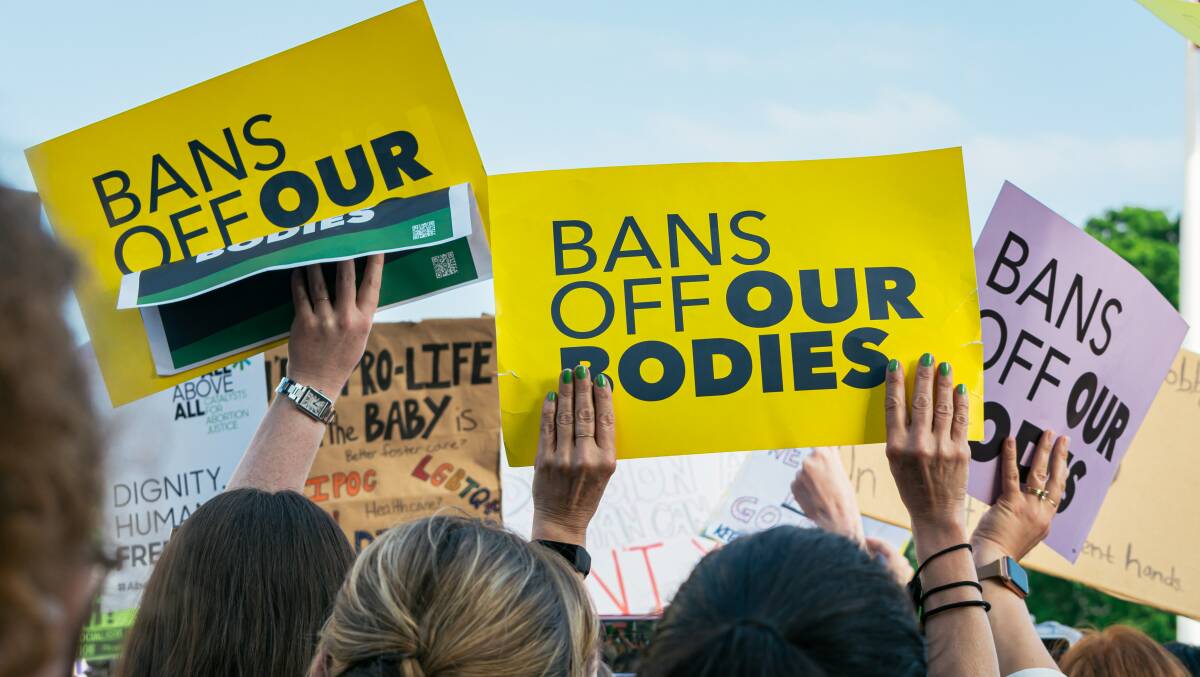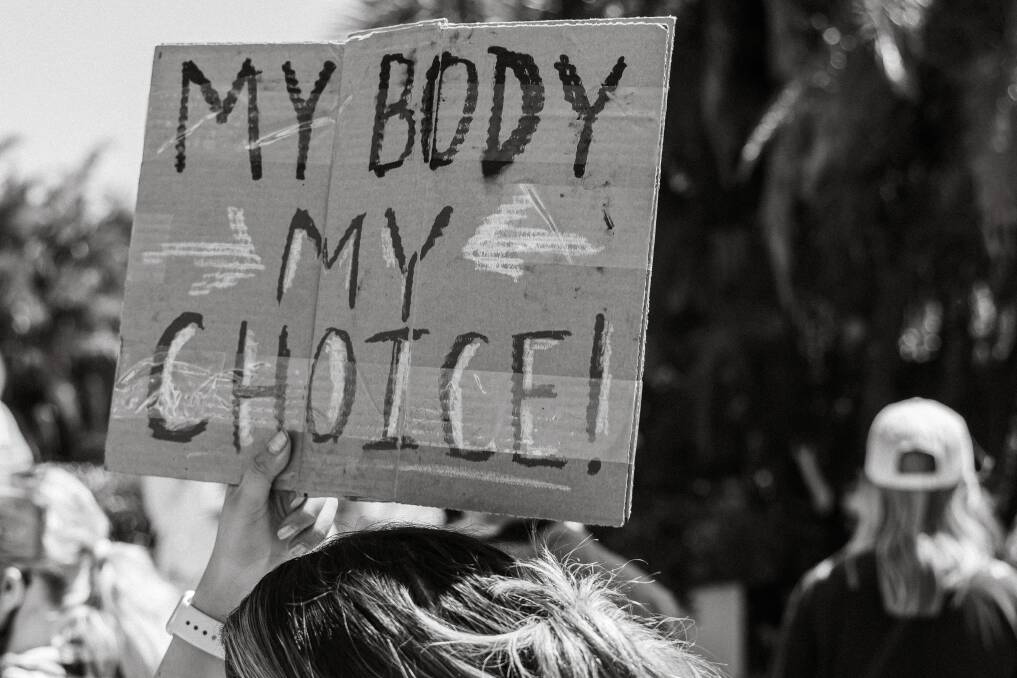
With the United States Supreme Court overturning Roe v Wade, and a number of states moving to immediately ban abortion, the trickle-down effect has been felt across the globe.
Create a free account to read this article
$0/
(min cost $0)
or signup to continue reading
Roe v Wade was a decision made by the United States Supreme Court in 1973 which ruled that the US constitution generally protected a woman's freedom to choose to have an abortion.
Women both in the US and various other countries, including Australia, have been left contemplating their bodily autonomy, and the ramifications the new regulations may have on their lives and the lives of future generations.
When people don't have access to safe, medically regulated abortions, the World Health Organisation says they often turn to unsafe abortion - and according to the organisation's research unsafe abortion is a "leading, yet preventable" cause of maternal death and morbidities.
Each year 4.7-13.2 per cent of maternal deaths in the world are attributed to unsafe abortions, with estimates from 2012 showing that in developing countries alone 7 million women a year were treated in hospital for complications from unsafe abortions.
The Mail sat down with three women from Western Australia who have terminated a pregnancy, and heard how the news from the US impacted them.
'It would've meant abject poverty': Carly's story
Carly* is a mother of three with a career and life that she loves, a circumstance she said she would never have found herself in if she hadn't been able to terminate a pregnancy in early 2010.
She had ended her marriage and was dating another man.
With a one-year-old child, Carly was living on a single income stream for the first time when she unexpectedly fell pregnant.
"I was self sufficient for the first time in a very long time - I really had to rely on myself, I was it in terms of finances, safety and security," Carly said.
"I had just returned to work after maternity leave and found myself expecting a baby - it was one of the hardest decisions I've ever had to make in my life but I chose not to have another baby at that time.
I potentially could've been at the point of suicide if I'd been told I had to have a baby.
- Erica
"I prioritised the child I had and the life that I wanted over having another baby - it would've financially ruined me. It would've meant abject poverty, not just for myself but for my one-year-old."
Carly said that while WA has some of the most restrictive processes out of all of the states in Australia, she managed to navigate the system without too much trouble.
She visited her GP, who laid out the information and helped refer her to a clinic. Western Australia requires a person seeking to terminate a pregnancy to be referred by a GP, with further requirements after the 20-week mark
"I didn't feel judged or like anyone was trying to sway me one way or another. They gave me a list of the clinics that I could call."
When Carly arrived at the clinic, she spoke to a second GP who she said was also helpful and honest about the potential emotional after effects which could arise after terminating a pregnancy.
After a physical exam and ultrasound, Carly went into the room for the procedure where they consulted her again before beginning the procedure.
"There was this massive quote above the reception desk which just made me feel like I was the author of my story," Carly said.
"It was their firm belief that every person had the right to choose when and how and in what order they created their families."
It has been 12 years since Carly's procedure, and when asked how she felt upon hearing the US Supreme Court's decision, she said through tears that she felt like she'd been "punched in the guts".
"I think this sums it up - I can talk about the process of my procedure and one of the most difficult decisions I've had to make, but then I think about women not having that power and that's what has tipped me over the edge."
She said it was hard to not be concerned about the possibility that one day Australia could follow suit, with a lot of the western world's influence coming from the US.
"I would hate for my children to be forced to become parents if they don't want to be. I hope they are free to create the family they want and not be forced to carry a baby they don't want."
'I don't know what I would've done': Erica's story
Erica* was in her early 20s and travelling with her partner when she took a positive pregnancy test, in a country where it was illegal to have an abortion.
"My partner and I weren't ready for a child, we hadn't been together long, we had plans to travel and see the world."
After contemplating where to travel to have a procedure done, she and her partner decided against America, fearing protesters may be at the clinics.
"It's a generalisation, I know, but I didn't want to get screamed at on my way into the clinic. We flew somewhere else," Erica said.
Erica said the overseas system she visited was private and comfortable, with counsellors and doctors asking questions and ensuring she had adequate support through what was a difficult time.
"I felt okay after, I knew we had made the right decision, but at the time I didn't want to tell anyone, I kept it to myself and felt really isolated with the stigma."

Eight years later, Erica found herself having to face the decision again after her contraception failed.
"I get quite bad mental health effects from contraceptive pills, so I had to use other contraception which wasn't as reliable. When I found out, I was upset - I thought 'how have I let this happen again?'
"That definitely came from a stigmatised place, it had been eight years between, which is a long time, but it felt like such a big deal."
Erica used the Australian health system and received a referral from a GP, and while the doctor didn't have much information about the different procedures or pricing, she was referred to a clinic which helped to fill her in.
"I managed to get an appointment two days later. I was more confident in my decision to want to focus on my career. It wasn't as upsetting, I was frustrated with myself but wasn't as upset."
Erica was also taken through a more suitable option for contraception at the clinic, which wouldn't adversely impact her mental health.
Upon hearing the news about Roe v Wade, Erica said she broke down, contemplating the devastating impacts of not having a choice in her own situation.
"I just got in my shower and cried. I immediately felt reserved in ever talking about it or telling my story - it made me worry this decision would normalise the opinions that it is a bad thing that should be controlled.
"If the procedure had been illegal here, I don't know what I would've done. It's a scary thought for me - I think it would've driven me down a very dark path. I potentially could've been at the point of suicide if I'd been told I had to have a baby."
She said that just as the world had started to destigmatise and open the conversation surrounding abortion, this decision had made her feel like the world was back at square one.
"It made me feel so much for the women in America, they must be feeling so helpless. It's devastating. It makes you think 'how far could the world go?'"
'My partner at the time thought it was a joke': Bree's story
Bree* was newly 18, had just gotten her driver's licence and was working part-time at a supermarket when she found out she was pregnant.
Her boyfriend at the time didn't want to have a child, but Bree took a few days to herself to think about what she wanted to do.
"I was working but doing hardly any hours at the time. I thought about it for a few days by myself and realised I was not financially or mentally in the position to raise a child. I was living at home, in reality it was just not possible for me to do it."
Bree said she considered other options, such as adoption, but felt the system was "broken" and it wasn't the right choice for her.
"For me both the foster and adoption systems are broken. I personally didn't think that would be a good option for me."
When Bree and her partner at the time went to the clinic, she said she had to tell her partner off several times for his behaviour.
"I realised he was a controlling and manipulative person. He just thought it was a massive joke and it wasn't a big deal to him.
"I felt ashamed of what I was doing. This was nine years ago and there was still a lot of judgement about women who got abortions."
The clinic staff walked Bree through the procedure and asked her to confirm several times that she wished to go through with the procedure before she went in.
"My boyfriend had the view that it's just nothing or a joke, I don't think he understood from my point of view what I went through. I knew I was doing the right thing for myself, but I still had to go through that experience."
Almost a decade later and Bree has finished her degree, started a new job in the health system and found a loving partner to share her life with.
"My life is now finally set up where I want it to be, I look back and feel I made the right choice. I beat myself up for it at the time, I spiralled into a depression because I beat myself up for it so much.
"But about a year later I was on Facebook and there was a trend where women shared their abortion stories, I read through so many of them and it helped me realise I wasn't a horrible person, what I did was my choice and it was okay."
Bree said the news from the US made her angry, and it felt like the world was "going backwards".
"Even though it is happening in America, it affects every woman on earth. You feel so much for women who may have to drive hours away to seek medical treatment. It's so upsetting.
"The fact that it's 2022 and we are all about equality and making sure everyone's happy in whatever body they want to be in and whoever they want to be - America has taken a giant step backwards.
"Why is it their choice on what we should do with our bodies? Why was this decision made?"
- If you or anyone you know is struggling, reach out to Lifeline on 13 11 14.
- The names in this story have been changed


